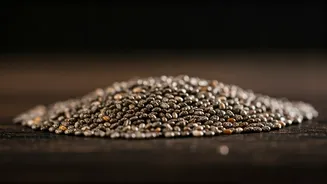Chia Seeds: Begin!
The journey to harnessing the anti-inflammatory properties of chia seeds begins with understanding their nutritional value. Chia seeds are a nutritional treasure,
packed with fiber, omega-3 fatty acids, antioxidants, and essential minerals like calcium, phosphorus, and manganese. Fiber aids in digestion and gut health, while omega-3s are renowned for their anti-inflammatory effects. Antioxidants fight free radicals, and the minerals support bone health and various bodily functions. This rich composition is the foundation of their ability to combat inflammation. Incorporating chia seeds into your diet means adding a nutrient-dense food that supports overall well-being, paving the way for the next crucial steps in maximizing their benefits.
Soaking, the First Step
Soaking chia seeds is the critical initial step to enhance their digestibility and unlock their benefits. When chia seeds are soaked in water for at least 30 minutes, they absorb the liquid and develop a gel-like consistency. This process breaks down the seeds' outer layer, making them easier for the body to digest and absorb the nutrients. Soaking also helps to reduce phytic acid, a compound present in seeds that can inhibit the absorption of minerals. By soaking the chia seeds, you ensure that your body can fully utilize the vitamins and minerals they offer. This preliminary step lays the groundwork for the next phases, ensuring the body efficiently reaps the rewards of these potent seeds.
Adding Chia to Your Diet
Integrating chia seeds into your diet is a straightforward process, offering versatility and adaptability to individual preferences. The soaked chia seeds can be consumed directly or incorporated into various meals. They can be added to smoothies, mixed with yogurt or oatmeal, or used as a thickening agent in sauces and puddings. Their neutral flavor makes them easy to blend into recipes without altering the taste significantly. Start with a small serving, such as one to two tablespoons daily, to allow your body to adjust. Gradually increase the intake as tolerated. Regular consumption of chia seeds can contribute to improved digestion, reduced inflammation, and a boost in overall health. This flexible approach ensures that chia seeds can fit seamlessly into any dietary plan.
Boost with Freshness
To maximize the anti-inflammatory benefits of chia seeds, combine them with other anti-inflammatory ingredients. Fresh fruits and vegetables are excellent choices to enhance the nutritional profile of the meal. Adding berries, rich in antioxidants, provides an extra layer of protection against inflammation. Leafy greens like spinach or kale are packed with vitamins and minerals that support overall health. Consider adding a squeeze of lemon juice, which boosts the absorption of nutrients and adds a refreshing flavor. By combining chia seeds with these fresh, whole foods, you create a powerhouse meal that actively combats inflammation. This step helps to amplify the positive effects of chia seeds, promoting enhanced well-being and a healthier lifestyle.
Consistency is Key
The final step in harnessing the power of chia seeds lies in consistency. Regular consumption is essential to experiencing the full benefits of chia seeds, specifically their anti-inflammatory effects. Incorporate chia seeds into your daily routine by adding them to your breakfast, snacks, or even your dinner. Over time, consistent intake can lead to noticeable improvements in digestion, energy levels, and overall health. Maintain a balanced diet, including regular exercise and adequate hydration. These lifestyle habits complement the effects of chia seeds. With perseverance, the body will adapt and the positive outcomes will be realized. By making chia seeds a part of your everyday life, you cultivate lasting well-being and a proactive approach to your health.





















